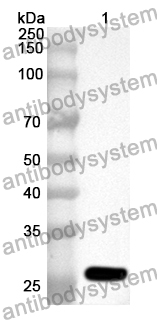Catalog No.
PHF68401
Species reactivity
Human, Mouse, Rat
Host species
Rabbit
Isotype
IgG
Clonality
Polyclonal
Immunogen
E. coli - derived recombinant Human KCNJ10 (Phe165-Val379).
Tested applications
ELISA: 1:4000-1:8000, IHC: 1:50-1:100, WB: 1:1000-1:4000
Target
ATP-dependent inwardly rectifying potassium channel Kir4.1, KCNJ10, ATP-sensitive inward rectifier potassium channel 10, Inward rectifier K(+) channel Kir1.2, Potassium channel, inwardly rectifying subfamily J member 10
Purification
Purified by antigen affinity column.
Accession
P78508
Applications
ELISA, IHC, WB
Form
Liquid
Storage buffer
0.01M PBS, pH 7.4, 50% Glycerol, 0.05% Proclin 300.
Stability and Storage
Use a manual defrost freezer and avoid repeated freeze thaw cycles. Store at 2 to 8°C for frequent use. Store at -20 to -80°C for twelve months from the date of receipt.
Regional Alterations in Müller Cell Protein Expression in Human and a Rat Model of Geographic Atrophy., PMID:39918478
Cytokine Levels in Experimental Branch Retinal Vein Occlusion Treated With Either Bevacizumab or Triamcinolone Acetonide., PMID:38899953
Coexistence of temporal lobe epilepsy and idiopathic generalized epilepsy., PMID:38160579
Aglycosylated extracellular loop of inwardly rectifying potassium channel 4.1 (KCNJ10) provides a target for autoimmune neuroinflammation., PMID:36910419
Anti-Kir4.1 Antibodies in Multiple Sclerosis: Specificity and Pathogenicity., PMID:33348803
Oligodendrocyte-encoded Kir4.1 function is required for axonal integrity., PMID:30204081
Dimethylation of Histone 3 Lysine 9 is sensitive to the epileptic activity, and affects the transcriptional regulation of the potassium channel Kcnj10 gene in epileptic rats., PMID:29115470
Low reliability of anti-KIR4.183-120 peptide auto-antibodies in multiple sclerosis patients., PMID:28548026
Absence of antibodies against KIR4.1 in multiple sclerosis: A three-technique approach and systematic review., PMID:28414733
Anti-KIR4.1 Antibodies in Chinese Patients with Central Nervous System Inflammatory Demyelinating Disorders., PMID:28391264
Detection of potassium channel KIR4.1 antibodies in Multiple Sclerosis patients., PMID:28300540
Multiple Sclerosis and Antibodies against KIR4.1., PMID:27074084
Evaluation of KIR4.1 as an Immune Target in Multiple Sclerosis., PMID:27074083
Isolation and characterization of neural stem cells from dystrophic mdx mouse., PMID:27015747
Superresolution Imaging of Aquaporin-4 Cluster Size in Antibody-Stained Paraffin Brain Sections., PMID:26682810
Humoral Responses to Diverse Autoimmune Disease-Associated Antigens in Multiple Sclerosis., PMID:26065913
Antibodies to the inward rectifying potassium channel 4.1 in multiple sclerosis: different methodologies--conflicting results?, PMID:25583849
Increased anti-KIR4.1 antibodies in multiple sclerosis: could it be a marker of disease relapse?, PMID:25392324
Investigation of the KIR4.1 potassium channel as a putative antigen in patients with multiple sclerosis: a comparative study., PMID:25008548
Expression of astrocyte-related receptors in cortical dysplasia with intractable epilepsy., PMID:25003238
Differential loss of KIR4.1 immunoreactivity in multiple sclerosis lesions., PMID:24777949
Lack of confirmation of anti-inward rectifying potassium channel 4.1 antibodies as reliable markers of multiple sclerosis., PMID:24756568
Potassium channel KIR4.1-specific antibodies in children with acquired demyelinating CNS disease., PMID:24415573
Effects of arteriolar constriction on retinal gene expression and Müller cell responses in a rat model of branch retinal vein occlusion., PMID:24292703
Enhanced accumulation of Kir4.1 protein, but not mRNA, in a murine model of cuprizone-induced demyelination., PMID:24070676
Expressional analysis of inwardly rectifying Kir4.1 channels in Noda epileptic rat (NER)., PMID:23603404
Disease mechanisms in MS: the potassium channel KIR4.1--a potential autoantigen in MS., PMID:22986435
Loss of perivascular Kir4.1 potassium channels in the sclerotic hippocampus of patients with mesial temporal lobe epilepsy., PMID:22878665
Co-localisation of K(ir)4.1 and AQP4 in rat and human cochleae reveals a gap in water channel expression at the transduction sites of endocochlear K(+) recycling routes., PMID:22802001
Antibodies to potassium channels in multiple sclerosis., PMID:22784120
Potassium channel KIR4.1 as an immune target in multiple sclerosis., PMID:22784115
Evidence that compromised K+ spatial buffering contributes to the epileptogenic effect of mutations in the human Kir4.1 gene (KCNJ10)., PMID:21748805
Differential regulations of AQP4 and Kir4.1 by triamcinolone acetonide and dexamethasone in the healthy and inflamed retina., PMID:21724913
Expression of aquaporin 4 and Kir4.1 in diabetic rat retina: treatment with minocycline., PMID:21672350
Regulation of Kir4.1 and AQP4 expression and stability at the basolateral domain of epithelial MDCK cells by the extracellular matrix., PMID:21543416
Molecular basis of decreased Kir4.1 function in SeSAME/EAST syndrome., PMID:21088294
Spatial and temporal dissociation of AQP4 and Kir4.1 expression during induction of refractive errors., PMID:20806048
Glial dystrophin-associated proteins, laminin and agrin, are downregulated in the brain of mdx mouse., PMID:20714324
Morphological observation of the stria vascularis in midkine and pleiotrophin knockout mice., PMID:20561761
Deletion of aquaporin-4 renders retinal glial cells more susceptible to osmotic stress., PMID:20544823
The neuroretina is a novel mineralocorticoid target: aldosterone up-regulates ion and water channels in Müller glial cells., PMID:20466875
Heterogeneity of Kir4.1 channel expression in glia revealed by mouse transgenesis., PMID:19382212
Retinal gene expression and Müller cell responses after branch retinal vein occlusion in the rat., PMID:18806298
Müller cell response to blue light injury of the rat retina., PMID:18450590
Cellular localization of facilitated glucose transporter 1 (GLUT-1) in the cochlear stria vascularis: its possible contribution to the transcellular glucose pathway., PMID:18196278
Kir4.1 channels regulate swelling of astroglial processes in experimental spinal cord edema., PMID:17953658
Modulation of the heteromeric Kir4.1-Kir5.1 channel by multiple neurotransmitters via Galphaq-coupled receptors., PMID:17559083
Porcine Müller glial cells increase expression of BKCa channels in retinal detachment., PMID:17364747
Progressive loss of a glial potassium channel (KCNJ10) in the spinal cord of the SOD1 (G93A) transgenic mouse model of amyotrophic lateral sclerosis., PMID:16925593
Regulation of the astrocyte resting membrane potential by cyclic AMP and protein kinase A., PMID:16856152

